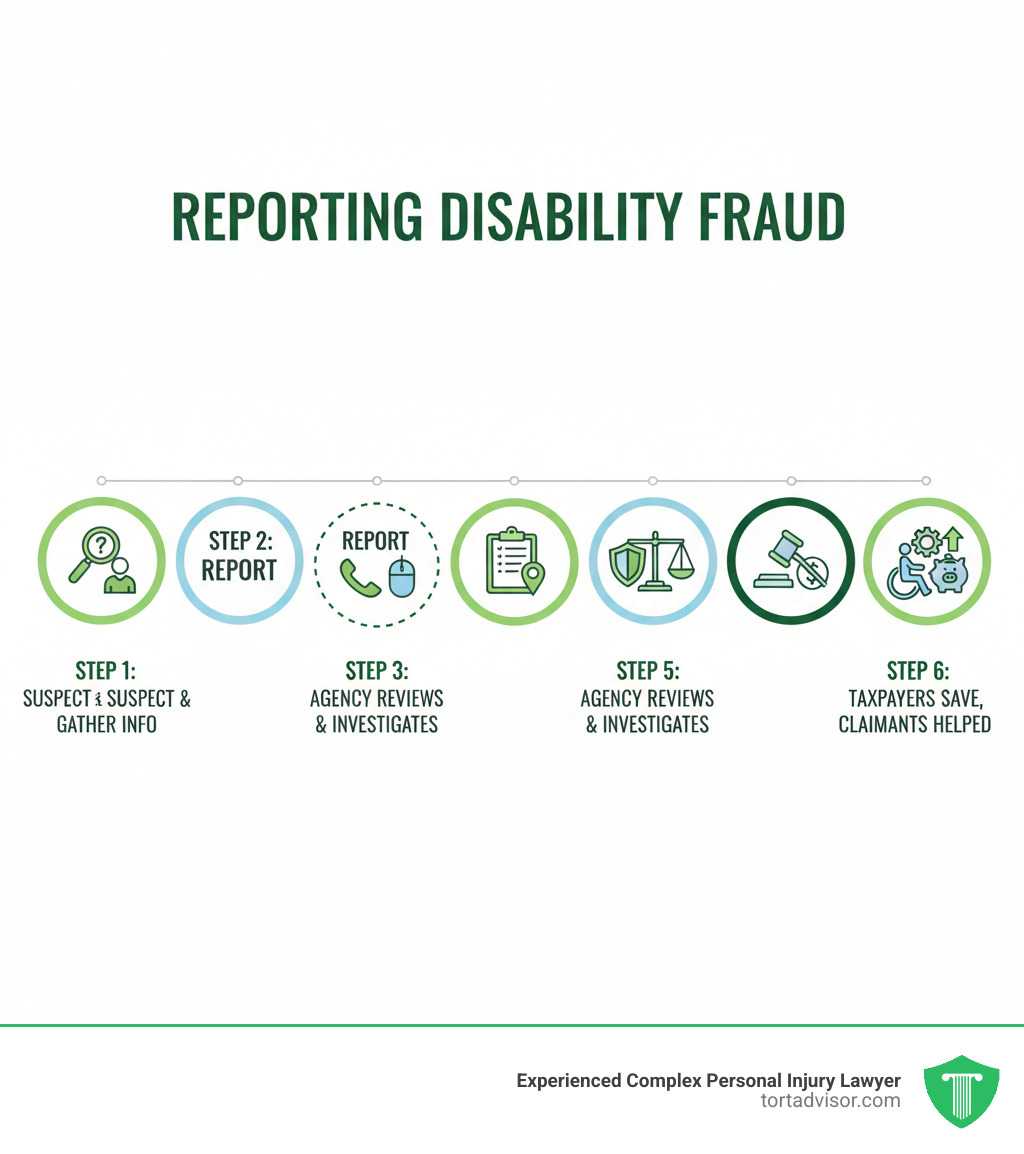


Why Disability Benefits Fraud Matters to Everyone
Disability benefits fraud is the act of unlawfully receiving payments by providing false information or concealing facts about eligibility. This crime drains billions from vital programs like Social Security Disability Insurance (SSDI) and Supplemental Security Income (SSI), harming taxpayers and delaying help for those who genuinely cannot work.
To report suspected disability benefits fraud:
- United States: Call the SSA Fraud Hotline at 1-800-269-0271 or report online at oig.ssa.gov.
- Canada: Call Service Canada at 1-800-206-7218 (EI fraud) or 1-800-277-9914 (CPP/OAS fraud).
- You can remain anonymous.
- Provide the person’s name, address, and specific reasons for suspicion.
When someone commits fraud, they steal from individuals with severe medical conditions. In fiscal year 2022, anti-fraud efforts by the Cooperative Disability Investigations (CDI) program alone saved over $33 million for SSA disability programs and $46 million for related programs like Medicare.
The problem is widespread, with schemes ranging from individuals working while collecting benefits to organized rings defrauding insurance carriers of hundreds of thousands of dollars. This fraud increases insurance premiums, drains public funds, and creates delays for legitimate claimants.
Consequences are severe, including imprisonment for 12 to 27 months, restitution payments from $200,000 to over $500,000, and a permanent ban on future benefits. Reporting suspected fraud is a crucial step in protecting these essential safety nets.
My name is Mason Arnao. My work in data management and secure systems has shown me how technology helps agencies detect and investigate fraudulent claims, protecting the integrity of these programs for everyone.
Disability benefits fraud helpful reading:
- Denied disability claim
- Disability claim assistance
- how to claim social security disability insurance arkansas
What is Disability Benefits Fraud and What Does It Look Like?
Disability benefits fraud involves deliberately lying or hiding information to receive payments one is not entitled to. This affects government programs like Social Security Disability Insurance (SSDI) and Supplemental Security Income (SSI), as well as private insurance and Canadian programs. Unlike an honest mistake, fraud is a calculated deception that erodes public trust and makes it harder for genuinely disabled individuals to get help. The deception is often complex, requiring the manipulation of medical evidence and concealment of physical abilities over time.
If you believe your benefits were wrongly denied, resources like More info about SSDI Lawsuits can help you understand your legal options.
Common Methods Used to Commit Disability Benefits Fraud
Fraudulent tactics all involve intentional deception. Common methods include:
- Exaggerating a condition: Overstating the severity of a real medical issue to qualify for benefits.
- Faking an injury or illness: Pretending to have a condition that doesn’t exist, sometimes with falsified medical records.
- Concealing work activity: Working “under the table” while claiming to be completely unable to work.
- Hiding income or assets: Failing to report financial resources to qualify for needs-based programs like SSI.
- Representative payee misuse: An appointed person spending a disabled individual’s benefits on themselves.
- Deceased payee fraud: Continuing to cash a deceased person’s benefit checks.
- Misrepresenting marital status: Claiming to be single to hide a working spouse’s income, which affects SSI eligibility.
Investigators are trained to spot these well-documented tactics. You can learn more about how fraud is identified at Identifying Disability Fraud.
The Staggering Financial Cost
The financial toll of disability benefits fraud is immense, costing taxpayers hundreds of millions annually. The Cooperative Disability Investigations (CDI) program, a key anti-fraud initiative, has saved taxpayers a total of $7.9 billion since its inception.
State-level fraud is also a major issue. In one fiscal year, California identified suspected fraud claims with a potential loss of over $109 million. One scheme alone involved suspects creating fake companies to steal over $450,000 from insurance carriers and $60,000 from COVID-19 relief funds, as detailed in this Department-led investigation leads to arraignment of a dozen suspects in disability fraud scheme. Every dollar lost to fraud is a dollar unavailable for legitimate claimants and public services.
How to Report Suspected Disability Benefits Fraud
If you suspect disability benefits fraud, reporting it helps protect a vital system for those in need. Agencies have confidential reporting systems and you can remain anonymous. Whistleblower laws also offer protection against retaliation.
To make your report effective, provide as much detail as possible:
- Who is the person you suspect? (Name and address)
- What are they doing that seems fraudulent? (e.g., working a specific job, hiding income)
- When and where did you observe this activity?
- How do you know about it?
You don’t need to be a detective; even partial information can launch an investigation by trained professionals.
Reporting Fraud in the United States
The Social Security Administration’s Office of the Inspector General (SSA OIG) handles fraud related to SSDI and SSI.
- Phone: Call the SSA Fraud Hotline at 1-800-269-0271 (Mon-Fri, 10 a.m. to 4 p.m. ET). TTY: 1-866-501-2101.
- Online: Use the detailed form at Report Fraud to the SSA OIG.
- Mail: Send reports to Social Security Administration Fraud Hotline, OIG, P.O. Box 17785, Baltimore, MD 21235.
For fraud in state-run programs, search your state’s official government website for “report welfare fraud” to find the correct agency.
Reporting Fraud in Canada
Disability benefits in Canada are both federal and provincial.
- Federal Programs: For Canada Pension Plan (CPP) fraud, call Service Canada at 1-800-277-9914. For Employment Insurance (EI) fraud, call 1-800-206-7218.
- Tax-Related Fraud: Report issues with disability tax credits to the Canada Revenue Agency (CRA) through its Leads Program.
- Provincial Programs: Each province has its own system. For example, to report fraud in Ontario’s ODSP, use the provincial welfare fraud hotline or the online form at Report suspected welfare fraud online in Ontario.
Your identity is protected by privacy laws, and reporting ensures that public funds go to those who genuinely need them.
The Fight Against Fraud: Agencies, Penalties, and Prevention
The fight against disability benefits fraud involves coordinated efforts from government agencies, tough legal penalties, and preventative measures to protect program integrity.
Key Agencies and Investigative Programs
In the U.S., the Social Security Administration’s Office of the Inspector General (SSA OIG) leads the charge, primarily through its Cooperative Disability Investigations (CDI) program. CDI units are highly effective, bringing together federal, state, and local law enforcement to investigate suspicious claims before benefits are paid. Using surveillance, interviews, and record analysis, these teams work to stop fraud at the source.
The program’s success is clear: since its inception, CDI investigations have resulted in approximately $7.9 billion in projected savings for taxpayers, as detailed in the Cooperative Disability Investigations Program report. Private insurance companies also play a role, using their own fraud units and artificial intelligence to detect suspicious patterns and collaborating on joint investigations.
Legal Consequences of Disability Benefits Fraud
The penalties for disability benefits fraud are severe, reflecting the seriousness of the crime. Convictions often lead to:
- Felony Charges: A permanent criminal record affecting future employment and housing.
- Imprisonment: Sentences commonly range from 12 to 27 months.
- Restitution: Courts order fraudsters to repay everything they stole, with amounts often ranging from $200,000 to over $500,000.
- Denial of Future Benefits: A fraud conviction can permanently disqualify an individual from receiving disability benefits, even for a future legitimate claim.
In Canada, fraud is prosecuted under laws like the Criminal Code of Canada. Lawmakers in the U.S. are also working to strengthen anti-fraud laws, such as the proposed Disability FRAUD Prevention Act, which would introduce tougher penalties, mandatory restitution, and new felony charges for professionals who abuse their positions of trust.
The stakes are incredibly high if you are accused of fraud. For help with denied claims or legal challenges, resources like More info on Denied Disability Claims can provide crucial guidance.
Frequently Asked Questions about Disability Fraud
We know disability benefits fraud can be confusing. Here are answers to the most common questions.
What is the difference between disability fraud and a simple error?
The key difference is intent. Fraud is knowingly providing false information to get benefits, such as faking an illness or hiding a job. An error is an unintentional mistake, like forgetting to report a small gift or making a typo on a form. Investigators look for patterns of deliberate deception before pursuing charges. If you realize you’ve made a mistake, contact the agency immediately to correct it.
What are the challenges in detecting fraud for ‘silent’ disabilities?
“Silent” or invisible disabilities, like chronic pain, fibromyalgia, or severe mental health conditions, are not visually apparent. A person may appear healthy on a “good day,” making it difficult to assess their overall inability to work based on surveillance alone. Investigators must rely on a comprehensive review of medical records, treatment histories, and expert opinions to verify a claim’s legitimacy. This makes these cases complex and highlights why strong medical documentation is crucial for legitimate claimants.
What should I do if I am wrongly accused of disability benefits fraud?
Being wrongly accused is serious and stressful. Take these immediate steps:
- Do not ignore notices. Respond to all official communications promptly.
- Gather documentation. Collect all medical, financial, and employment records that support your case.
- Understand the accusation. Read the notice carefully to know exactly what you are being accused of.
- Seek legal advice immediately. An experienced disability attorney can protect your rights and guide you through the process.
For help finding qualified legal representation, visit More info on Disability Claim Assistance to connect with specialty attorneys who handle these complex cases.
Protecting the System and Your Rights
Disability benefits fraud is not a victimless crime; it steals resources from the truly disabled, burdens taxpayers, and complicates the application process for those in desperate need. Reporting suspected fraud is a vital act of public service that protects the integrity of this essential safety net. You can report anonymously, and agencies investigate every claim thoroughly.
If you legitimately need benefits, do not be discouraged by the rigorous process. Be honest and thorough with your application. If your claim is denied, you have the right to appeal. Resources like Disability Claim Assistance can help guide you.
If you are wrongly accused of disability benefits fraud, securing expert legal representation is critical. False accusations are devastating, and navigating the legal system while managing a disability can be overwhelming.
That’s where Tort Advisor comes in. We connect individuals facing complex legal challenges, including SSDI Lawsuits, with top-rated specialty attorneys. We work exclusively with lawyers who have proven track records in disability law to ensure you have an expert advocate fighting for the best possible outcome. Whether you are appealing a denied claim or defending against false accusations, the stakes are too high to go it alone.
Protecting the system requires both standing up against fraud and defending the rights of those who need support. It’s a balance that ensures these critical programs remain available for generations to come.
Free Confidential Case Evaluation
Complete the short form below to get an immediate FREE case review with an expert in your specific claim. Don't wait, your case could be time sensitive to file a claim.
Related Posts
Discover New Jersey disability benefits: TDI, FLI, SSDI, SSI rates, eligibility, applications & appeals for 2025-2026.
Hire a Depo-Provera lawsuit attorney now. Fight Pfizer for meningioma risks from injections. Free consult, MDL updates & settlements up to $1.5M.
Find top Miami florida car accident lawyers after your 305 crash. Get max compensation, navigate no-fault laws & choose the best experts now!
Diagnosed with cancer after Roundup? Learn about the monsanto roundup lawsuits, eligibility criteria, and how to pursue your claim.
Discover how do you qualify for a hair relaxer lawsuit: criteria, diagnoses, evidence & brands in uterine cancer MDL. Claim review now!
Find the best uber sexual assault lawsuit lawyer: expert guides, MDL experience, proven results & nationwide firms for justice.










